 “If we choose, we can immediately become great souls by surrendering to Krishna, but because we have doubts whether or not Krishna is actually the Supreme we have to take time to dissipate these doubts through study of the scriptures.” (Shrila Prabhupada, Raja-vidya, Ch 7) “If we choose, we can immediately become great souls by surrendering to Krishna, but because we have doubts whether or not Krishna is actually the Supreme we have to take time to dissipate these doubts through study of the scriptures.” (Shrila Prabhupada, Raja-vidya, Ch 7)That Lord Krishna is the Supreme Personality of Godhead can be understood and accepted in a second. There needn’t be any doubt, because the acharyas, the celebrated teachers following in the line of disciplic succession emanating from Krishna Himself, validate this information. They not only agree that Krishna is worshipable and capable of granting everything the soul could ever want, but they back up their claims by showing an incomprehensible level of dedication. Despite the historical and visible evidence available, the conditioned soul remains doubtful, for through the spiritual evolutionary process, the aversion to divine love steadily increases. Therefore to dissipate doubt, to remove concerns over wasting time and effort in a spiritual discipline that may or may not yield benefits, study of scripture, especially the Bhagavad-gita, is required. Once these doubts are removed, there is a higher platform of engagement to be reached; elevation into the most sublime plane of existence, one enjoyed by those who have no doubts about Krishna’s all-attractiveness. 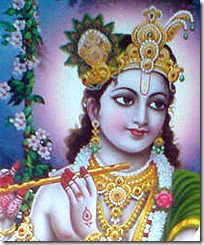 So what is Krishna’s real position? Why should we surrender unto Him without any qualms? After all, aren’t other religions espousing similar beliefs, that their particular object of worship is God, or the Supreme Lord? Actually, non-Vedic faiths do have similar beliefs and recommendations, but there is little to no concrete evidence provided about the object of worship’s nature. For instance, worship of God and adherence to His commandments, regulations and recommendations allow for a general system of maintenance, a regulated way of life to be followed, but the properties of the Supreme Person and the interactions one can have with Him are not discussed at all. If anything, these are left up to the interpretations of the worshiper. So what is Krishna’s real position? Why should we surrender unto Him without any qualms? After all, aren’t other religions espousing similar beliefs, that their particular object of worship is God, or the Supreme Lord? Actually, non-Vedic faiths do have similar beliefs and recommendations, but there is little to no concrete evidence provided about the object of worship’s nature. For instance, worship of God and adherence to His commandments, regulations and recommendations allow for a general system of maintenance, a regulated way of life to be followed, but the properties of the Supreme Person and the interactions one can have with Him are not discussed at all. If anything, these are left up to the interpretations of the worshiper.However, we know that when placed in a dark room and required to describe a painting on the wall or whatever else is around, no two people will reach the same conclusion. This reveals the primary fault with mental speculation, that it can never uncover true knowledge. One person may posit a specific theory and another person their own, but who will settle the debate? One worshiper may view the Lord as angry and vengeful, while another says He is the most merciful, but how are we to know for sure? What does God even look like, and why does He need us to worship Him? Is He even male? The Vedas shed some light on these issues by not only discussing the Lord’s features but also documenting some of His innumerable activities performed in both the spiritual world and the land we currently occupy. His original form is described as Krishna because He is all-attractive. If you’re God, You will of course be the best at everything, including enchanting the hearts and minds of your worshipers. Krishna is the Supreme Personality of Godhead, or Bhagavan, which means that He possesses all fortunes. He is not lacking anything. One look at His smiling face depicted in a picture or statue is enough to melt even the hardest of hearts. Krishna’s position is firmly established by the bliss He gives to His devotees, those souls who never want to leave His company. 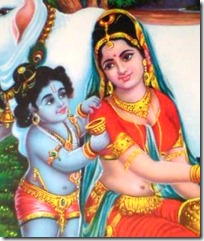 The interactions Krishna has with His friends, relatives and intimate partners give a glimpse into the variety of relationships available to the surrendered souls. While God is typically viewed as the superior entity, the Supreme Lord actually takes more pleasure when His servants, we spirit souls, command Him and exhibit an equal or superior attitude borne out of love. For instance, Krishna’s very good childhood friend Madhumangala had affectionate dealings with the Lord, even though the two remained on equal footing. During Krishna’s time on earth in Vrindavana, the accounts of which give a glimpse into the eternal life that is found in the spiritual land with the same name, Madhumangala would spend much time with the Lord and make many jokes about eating nice sweets and doing penances to be able to procure even more food. Madhumangala, though studying the scriptures and learning about penance and austerity, nevertheless liked to joke with Krishna, the fountainhead of all religious systems, about how much he liked to eat and how he so much enjoyed receiving sweets and other delights from Krishna’s mother, the queen of Vraja, Yashoda Mayi. The interactions Krishna has with His friends, relatives and intimate partners give a glimpse into the variety of relationships available to the surrendered souls. While God is typically viewed as the superior entity, the Supreme Lord actually takes more pleasure when His servants, we spirit souls, command Him and exhibit an equal or superior attitude borne out of love. For instance, Krishna’s very good childhood friend Madhumangala had affectionate dealings with the Lord, even though the two remained on equal footing. During Krishna’s time on earth in Vrindavana, the accounts of which give a glimpse into the eternal life that is found in the spiritual land with the same name, Madhumangala would spend much time with the Lord and make many jokes about eating nice sweets and doing penances to be able to procure even more food. Madhumangala, though studying the scriptures and learning about penance and austerity, nevertheless liked to joke with Krishna, the fountainhead of all religious systems, about how much he liked to eat and how he so much enjoyed receiving sweets and other delights from Krishna’s mother, the queen of Vraja, Yashoda Mayi.Another very good friend of Krishna’s was Shridama, who would play-fight with the Lord quite often. Krishna is God after all, so who can ever defeat Him in anything? But Shridama and others were affectionate friends who viewed the Lord as an equal. Therefore not only would they defeat Krishna in their play-fighting, but they would brag about their triumphs as well. Shri Krishna takes great pleasure in this, for the devotee remains attached to Him through these pastimes. Similarly, Mother Yashoda used to feed Krishna every single day with the greatest affection, always worrying that He and His elder brother Balarama weren’t eating enough. “You play out in the fields every day with the cows, but You don’t realize how much energy that takes out of You. I try to call You to come home countless times, but You never listen. Finally when You do come home, You don’t eat enough. How will You grow up to be strong and stout if You don’t eat properly?” In this way Mother Yashoda was completely immersed in Krishna consciousness, not taking her son to be the Supreme Lord. 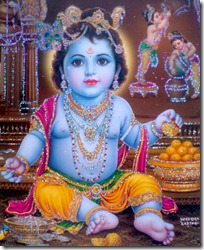 The gopis, the cowherd girls of Vrindavana, are considered the greatest lovers, because they renounce all ties to family and societal rules and regulations in favor of being with Krishna. They also teased the Lord very much, calling Him names and downplaying His killing of the powerful demons that would come to Vrindavana to attack Him. Again, these comments and sentiments thrill the Lord to no end, as they emanate from a mood of great love. No one can be more attached to Krishna than the gopis, for they think of Him at all hours of the day, worrying about His well-being and fearing that they will never see Him again. They just can’t wait for the nightfall and the moonrise to come, as these signal the time that they might have a rendezvous with Krishna in the forest, where Vrinda Devi, the goddess of devotion, takes every step necessary to ensure that the environment is just right for the loving exchanges between Krishna and His devotees to flow uninhibited. The gopis, the cowherd girls of Vrindavana, are considered the greatest lovers, because they renounce all ties to family and societal rules and regulations in favor of being with Krishna. They also teased the Lord very much, calling Him names and downplaying His killing of the powerful demons that would come to Vrindavana to attack Him. Again, these comments and sentiments thrill the Lord to no end, as they emanate from a mood of great love. No one can be more attached to Krishna than the gopis, for they think of Him at all hours of the day, worrying about His well-being and fearing that they will never see Him again. They just can’t wait for the nightfall and the moonrise to come, as these signal the time that they might have a rendezvous with Krishna in the forest, where Vrinda Devi, the goddess of devotion, takes every step necessary to ensure that the environment is just right for the loving exchanges between Krishna and His devotees to flow uninhibited.These interactions and joys are available to anyone who accepts Krishna as the Supreme Lord. Thus far there has been no mention of piety, sin, birth, death, reincarnation, surrender through a formal ritual, allegiance to a particular organization, or anything perfunctory about religious life. There has been no analysis of the different processes to understand Krishna and why life without Him represents the depths of darkness. Simply through accepting Krishna as the savior without any doubts so much joy and happiness is found. The reservoir of pleasure is Shri Krishna, and for anyone who follows Him wherever He goes, listening to His flute, seeing and hearing about His pastimes, and delighting in His interactions with His devotees, there is nothing lacking for them. 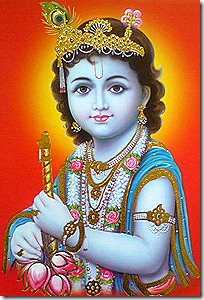 But since we have discrimination, the ability to think critically, and thus sometimes a doubting mind, we have trouble accepting Krishna’s position as the Supreme Lord. Perhaps we grew up in a different spiritual tradition or we have difficulty accepting the descriptions of paranormal events found within the Vedas. “Did Krishna really uplift a massive hill and hold it over His head for seven consecutive days? Were there really demons that came to Vrindavana and tried to kill Krishna? This sort of sounds like stuff out of comic books.” The best way to remove these doubts is to study the Bhagavad-gita, the Song of God, the most concise and complete treatise on spirituality, which not surprisingly is spoken by Krishna Himself. In this wonderful work, which has of all things the backdrop of a battlefield, Krishna dispels the doubts that temporarily and purposefully crept into the mind of a very powerful warrior named Arjuna on the eve of a battle that was to see the demise of millions of soldiers. But since we have discrimination, the ability to think critically, and thus sometimes a doubting mind, we have trouble accepting Krishna’s position as the Supreme Lord. Perhaps we grew up in a different spiritual tradition or we have difficulty accepting the descriptions of paranormal events found within the Vedas. “Did Krishna really uplift a massive hill and hold it over His head for seven consecutive days? Were there really demons that came to Vrindavana and tried to kill Krishna? This sort of sounds like stuff out of comic books.” The best way to remove these doubts is to study the Bhagavad-gita, the Song of God, the most concise and complete treatise on spirituality, which not surprisingly is spoken by Krishna Himself. In this wonderful work, which has of all things the backdrop of a battlefield, Krishna dispels the doubts that temporarily and purposefully crept into the mind of a very powerful warrior named Arjuna on the eve of a battle that was to see the demise of millions of soldiers.Arjuna is an eternally liberated soul and thus a constant companion of Krishna’s; therefore it is not possible for him to have doubts about Krishna’s supremacy. But due to temporary bewilderment and the need for teaching future generations about the benefits of worshiping Krishna, Arjuna showed hesitancy about the future course of action. He did not want the fighting to start, because family and friends were part of the opposing army. Showing attachment to his body and the material wellbeing of others, Arjuna decided it would be better to just give up and live in the forest, allowing the opposing side to rule over a kingdom that didn’t belong to them.
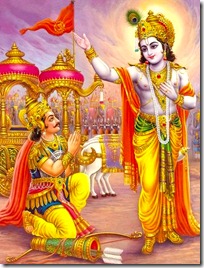 But rather than just quit right away, Arjuna took his concerns to Krishna. This was certainly a difficult spot for anyone, let alone the Supreme Lord. After all, we are friends with someone because we are on an equal footing with them, sharing similar experiences and desires. Once the position of equality is gone, the friendship takes on a different meaning. Krishna, seeing the distressed condition of His friend and cousin, immediately accepted the position of spiritual master, a role He has no difficulty playing. The guru, or spiritual guide, is the teacher of Vedic wisdom, whose ultimate conclusion calls for surrender unto God. Since Krishna is the object of instruction, naturally He has no problem describing information that is used to serve and please Him. But rather than just quit right away, Arjuna took his concerns to Krishna. This was certainly a difficult spot for anyone, let alone the Supreme Lord. After all, we are friends with someone because we are on an equal footing with them, sharing similar experiences and desires. Once the position of equality is gone, the friendship takes on a different meaning. Krishna, seeing the distressed condition of His friend and cousin, immediately accepted the position of spiritual master, a role He has no difficulty playing. The guru, or spiritual guide, is the teacher of Vedic wisdom, whose ultimate conclusion calls for surrender unto God. Since Krishna is the object of instruction, naturally He has no problem describing information that is used to serve and please Him.In the discourse that followed, Krishna revealed important concepts such as the eternality of the soul and its superior position to matter. The soul is the identifying unit within every form of life, and the body surrounding the soul is temporary. When there is death, only the body is discarded; the soul remains intact. Taking into account desire and the work performed during the just concluded life, the soul is placed into a new body right away through the laws of nature. This process is known as reincarnation. Though there is evolution in terms of the type of body the soul can occupy, the different forms already exist. They are just manifestations of matter after all, so there is nothing special about the 8,400,000 different species. The fact that the soul exists forever is a much more important truth to understand.
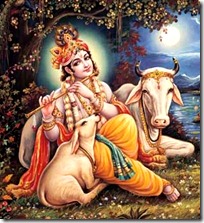 Though there are so many different bodies, the level of enjoyment is practically the same in all of them. This is a fact lost on virtually every philosopher who fails to take the Bhagavad-gita as their highest source of knowledge. Schemes to equalize outcomes, Freudian theory, the idea of a fit group of species surviving, and other popular notions not grounded in Vedic wisdom all have as their root the identification with the body accepted at birth and the need for material enjoyment. But according to Krishna, there is no difference between a learned priest, a dog, a cow, an elephant, and even an outcaste, or one who eats dogs. A dog may sleep in a different place than a human being, but the actual enjoyment of sleeping is still the same. The same goes for eating, mating and defending. Though there are so many different bodies, the level of enjoyment is practically the same in all of them. This is a fact lost on virtually every philosopher who fails to take the Bhagavad-gita as their highest source of knowledge. Schemes to equalize outcomes, Freudian theory, the idea of a fit group of species surviving, and other popular notions not grounded in Vedic wisdom all have as their root the identification with the body accepted at birth and the need for material enjoyment. But according to Krishna, there is no difference between a learned priest, a dog, a cow, an elephant, and even an outcaste, or one who eats dogs. A dog may sleep in a different place than a human being, but the actual enjoyment of sleeping is still the same. The same goes for eating, mating and defending.Since the soul always exists, it must also have an eternal engagement. This is why religion in the Vedic tradition is defined assanatana-dharma, or that occupational duty that has no beginning and no end. This dharma is not sectarian, nor is it subject to change. The soul’s dharma, its ultimate characteristic, is to be a lover of God, through and through. Every system of spirituality is meant to elevate the consciousness of the worshiper to the point that their nature becomes their true dharma; that is they become purely God conscious. Therefore it is not surprising to see that after all the information was presented to Arjuna about the workings of material nature, what happens to the soul after death, and how elevation to the highest platform of consciousness can be reached, Krishna advised him to simply surrender and be delivered of all sinful reaction.
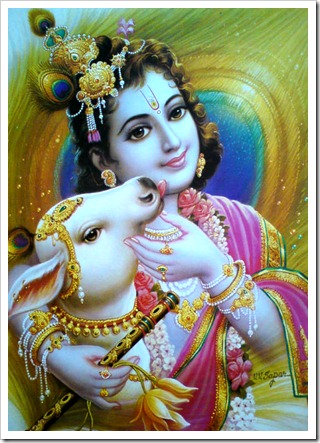 This surrender can take place in one second or it can come after lengthy study and discrimination, with tests for validity repeatedly applied to Krishna and the Vedas. Irrespective of how the position is reached, once there is surrender, the fun only begins. The surrendered souls, wherever they are, always keep Krishna in their minds. They always remember and honor Him by chanting His names, which are very nicely put together in the famous maha-mantra, “Hare Krishna Hare Krishna, Krishna Krishna, Hare Hare, Hare Rama Hare Rama, Rama Rama, Hare Hare.” Those who regularly recite this sacred formula with firm faith and a humble attitude will soon have no doubts about the supremacy of the person who is addressed. If we choose to be with Krishna in thought, word and deed, He will remain connected to us in a link of consciousness that can never be broken. This surrender can take place in one second or it can come after lengthy study and discrimination, with tests for validity repeatedly applied to Krishna and the Vedas. Irrespective of how the position is reached, once there is surrender, the fun only begins. The surrendered souls, wherever they are, always keep Krishna in their minds. They always remember and honor Him by chanting His names, which are very nicely put together in the famous maha-mantra, “Hare Krishna Hare Krishna, Krishna Krishna, Hare Hare, Hare Rama Hare Rama, Rama Rama, Hare Hare.” Those who regularly recite this sacred formula with firm faith and a humble attitude will soon have no doubts about the supremacy of the person who is addressed. If we choose to be with Krishna in thought, word and deed, He will remain connected to us in a link of consciousness that can never be broken. |
Search This Blog
Tuesday, July 12, 2011
Dissipating Doubts
Subscribe to:
Post Comments (Atom)
No comments:
Post a Comment